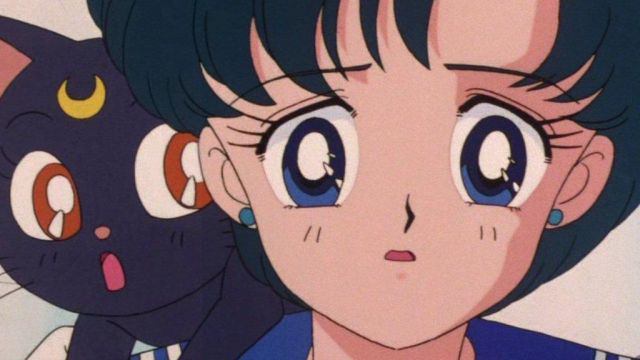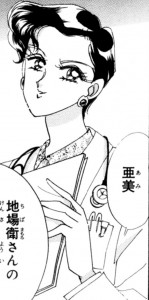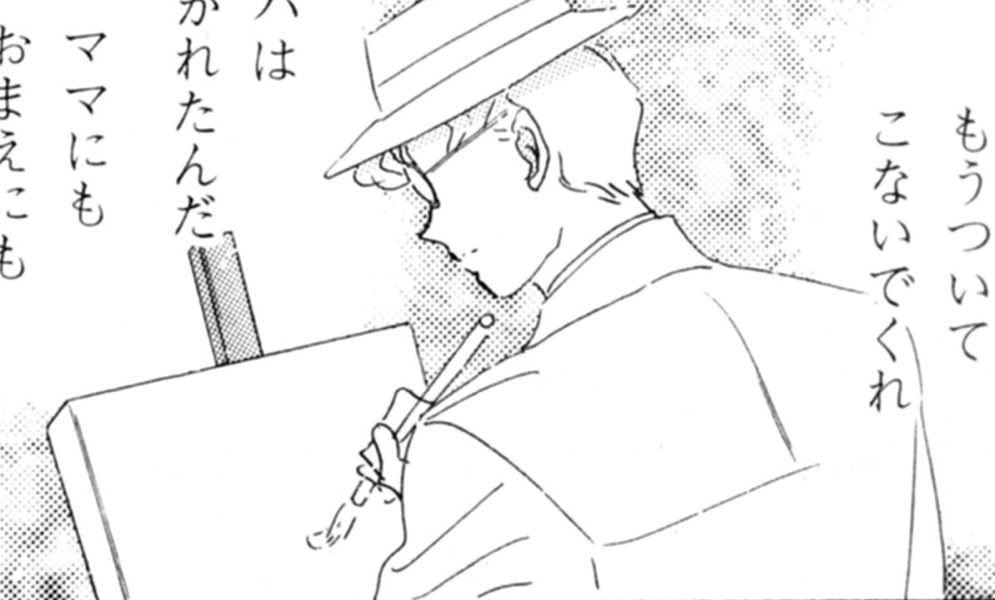The world of Sailor Moon is definitely not kind to happy and stable family lives, at least where parents are concerned. Between Makoto and her trouble with airplanes, Mamoru and his issue with cars, Rei and her difficulties with childbirth, and Hotaru and lab explosions, there seems to be dead parent epidemic going around – and that’s only among the main cast! When you look at it that way, I guess you could say that Ami got pretty lucky with only having her parents divorce. While divorce is a common thing that most of us have first- or second-hand experience with now, what did it mean for viewers back in 1990’s Japan? Surely how Japanese fans perceived it was different than how we look at it now (and in the west), right?
Like everything else we discuss, the answer is “complicated.” So let’s start with what we do know: Ami’s parents are divorced, her mother is a doctor, her father is an artist, and after the divorce she kept her father’s name.1 Divorce was certainly not uncommon back in the 1990s in Japan, but it definitely wasn’t something you generally saw on tv or in anime, so that was certainly forward-thinking of Ms. Takeuchi to put in. For a little bit of context, the crude divorce rate (i.e., the rate of divorce per 1,000 people)2 in 1991 in Japan was 1.4% (vs. 2.0% in 2010)3 and 4.7%4 and 6.8%5 respectively in the U.S.
Where Japan and America (and much of the west, in fact) differ most of all when it comes to divorce is that Japan is still a sole-custody-only country – meaning that shared/joint custody is not possible. In the overwhelming number of cases (nearing 90%), the mother retains custody of the children and the father is out of the picture. In fact, in nearly 40% of the cases, the non-custodial parent never sees their child again.6 This would explain why Ami continues to live with her mother and her father only keeps in touch via postcards.
We also know that she learned to swim and play chess from her father as a way of “keeping herself centered,” so we can assume they had a pretty good relationship. Her father is also a member of an high-class sports club (and the other members clearly know who he is), so we can probably assume that he does (or used to) live in the Tokyo area.
Though it’s never quite clear why her parents divorced or what kind of impact it had on Ami, we do know that at the time it definitely left her in the minority, and may have been partially responsible for part of her isolation from the other students in her class.7 One thing that is interesting to note is that while we associate the names of all of the Sailor Team with the female sailor soldiers, their last names actually all come from their fathers – and Ami is no exception. It definitely brings up the interesting question of how lineage works in the Sailor Moon universe, and how things change in Crystal Tokyo (no “Usagi Chiba” here!).
In another world and another time, it would’ve been interesting to see how Ami – the brains of the team – turned out if she lived with her father. At least I know I’d be interested in seeing it!
References:
- See vol. 4, p. 130 of the original manga ↩
- For more information on the difficulty of narrowing down divorce rates, see What is the Divorce Rate? ↩
- See Japanese Census ↩
- See United Nations Statistics ↩
- See CDC Statistics ↩
- See Divorce in Japan ↩
- See Act 2 of the manga (all volumes) ↩




haha these articles are fun to read. Very engaging 🙂 Keep the coming
Mercury’s father was always a character I had mixed feelings about. He sounded like such a great guy, but I could never figure out why he never visited his daughter more. The only things I could think of were perhaps he was too busy with work, or her mother didn’t like him visiting. Now that I know that Japan is a sole-custody-only country and how close to half of the other parents never see their kid again, it all makes sense. Now I can love him guilt-free! Lol I really love that Naoko had the guts to explore something that wasn’t being talked about too. I imagine the unique family situations of the Guardians really helped draw in a lot of kids who weren’t used to having a character they could relate to in that way. 🙂
Exactly how I felt about the situation growing up. I always felt like he was kind of a jerk and a distant father, but put into the sole-custody context (even for parents who want to share custody, it’s not possible) it just kinda makes sense.
Interestingly enough, the anime never really says directly that her parents are divorced, so he could just be off on an adventure as an artist kinda like Rei’s father, but I think they just didn’t want to address the issue because the anime was a bit more light-hearted than the manga.
That said, though, I’m really glad that Ms. Takeuchi wasn’t afraid to put in these alternate home lives and to (just maybe!) help out kids who were struggling with similar issues.
I’m glad it wasn’t just me! Come to think of it, this is a good example of how lack of cultural context changes our interpretation of a character.
I always found it a a bit of a shame the anime didn’t go into more detail. One of the strengths of the 90s anime was exploring the characters more, and we could’ve got a potentially interesting episode of how Ami deals with her parents being divorced. Then again, given how rare of a topic that was for anime/manga at the time, I wouldn’t be surprised if the anime staff was apprehensive to focus on it too much. At least the episode Ami’s father was mentioned in was still a good one either way. (one of my favorites, in fact!)
I think you see that a lot with the anime though – especially in the light-hearted and comedic flavor Rei and Usagi’s relationship takes, how silly Minako ends up being sometimes, etc. That’s why the death of all the senshi in the end of Classic is so shocking! But I could talk about that for days on end.
You also don’t go into as much depth with Rei hating her father and her mother’s death, which is a shame. Though they did touch on that a bit with Hotaru, so the definitely turned around a bit when Sailor Moon S hit the airwaves.
But I definitely agree with you: one of the most interesting things (and biggest challenges) of watching a show like this over 20 years later and with a completely different cultural view is that what’s “normal” can be pretty different. But hey, the show got me into learning Japanese in the first place, so I guess it really did succeed!
That’s a good point. I do think the case with Ami and Rei is a bit different though. With how different anime Rei is, I don’t think the parent storyline could’ve worked, at least not without some changes. But Ami’s similar enough to her manga counterpart I think they could’ve fit her parent storyline in more easily. Maybe not in the first season or two, but by the time S rolled around, they seemed to not be afraid of pushing the envelope more in terms of content.
I think it’s a testament to the show’s quality how it can still enthralls so many despite its age, or cultural differences. And that’s great! Cultures and languages are such a fascinating thing to learn about.
I always felt bad for Ami chan for having divorced parents. I really wanted to give her a hug.
I love that she has a more dynamic situation, but as someone with divorced parents myself, I definitely feel bad for her.
It also had the interesting hook that while it’s presented as a potential sad family situation — albeit when her head was being messed with by villains so certain ‘flashbacks’ might not be reliable memories — Ami doesn’t seem to specifically resent either parent the way Rei outright dislikes her own father or Minako butts heads with her own mother.
Since Ami’s mother is away so much, I always just assumed Ami took it upon herself to interact with her father on her own when the mood struck her and Ami’s mom just gave her the space to do that.
You made a mistake here, saying that the senshi’s last names all come from their fathers. You yourself have stated (though it might’ve been later) that it’s very likely that Rei, at least, got her last name from her mother, since her maternal grandfather is also named Hino, and in Japan it’s not especially uncommon (though not the norm) for a man to take his wife’s name.
And it’s possible this is true for some of the other senshi as well, since in many cases, there’s no particular indication either way.
I always assume that Mamoru would take Usagi’s name because she’s of higher status than him, as the world ruler, so descent from Usagi would be more important than descent from Mamoru. I think that traditionally this was how it worked in Japan when a man married up in social status (though of course it was usually frowned upon for highborn daughters to marry lowborn men, just like in any culture with social stratification).
Rei’s father is also referred to as Mr. Hino… as is her grandfather. So unfortunately it’s not clear cut which side of the family her last name comes from.
Names don’t always come from fathers. The current law says that a couple must choose either name even though in the majority of cases the woman takes her husband’s name. And that law hasn’t changed since SM times.
I don’t know what background Rei’s father had before his marriage and becoming a politician but it may have been advantageous for his political career to marry into the Hino family. Shrine owners may have some old links to the right circles. I know a former exchange student who spent his year in a shrine. And his host father, the kannushi, often went to meetings and dinners with the high society of Japan. Apparently, once in a while even the younger brother of the former emperor came to those meetings. But otherwise the father and the family in total seemed to be a normal loving family. So who knows what friends and acquaintances grandpa Hino had that were more worth than keeping the old name.
Oh, and now that I talk of it, a former student also told me once that her husband actually took his wife’s name and gave up his because she was the owner of a shop with a long tradition and wanted to keep that. The Japanese word for it is 婿入りmukoiri.
As an addition: As long as it’s not stated that Ami’s father is also called Mizuno, there is a very good chance that her mum went back to her pre-marriage name after her divorce. I have even some friends who did that. And it’s totally within the reality that she also did it for her daughter.